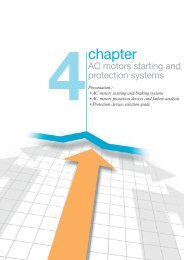Connect - Schneider Electric
Connect - Schneider Electric
Connect - Schneider Electric
You also want an ePaper? Increase the reach of your titles
YUMPU automatically turns print PDFs into web optimized ePapers that Google loves.
• talent Pool to foster talent development throughout the world and<br />
the access of women to key positions;<br />
• recruitment policies, succession planning, access to training,<br />
talent and promotion management, which pay particular attention<br />
to gender balance and new economies representation;<br />
• trainings leading to diplomas and qualifi cations for OATAM<br />
employee categories (Manual Workers, Administrative<br />
Employees, Technicians and Foremen), which impact is major<br />
on promotion and remuneration of women, particularly manual<br />
workers and assistants;<br />
• working session trainings on diversity for members of the<br />
Executive Committee and their management teams;<br />
• On-line training program dedicated to the promotion of diversity,<br />
launched globally in 2009.<br />
Gender balance<br />
In its diversity policy, <strong>Schneider</strong> <strong>Electric</strong> lays particular emphasis on<br />
equal career management for men and women as the best means<br />
to develop the values and skills required to meet the economic and<br />
societal challenges of the 21st Century. <strong>Schneider</strong> <strong>Electric</strong> shares<br />
the conviction that gender differences in the workplace (leadership<br />
style and personality among others) complement each other, foster<br />
innovation and provide a wealth of benefi ts to its customers.<br />
From an operational point of view, the strategy consists of:<br />
• promoting women in the talent pool and in positions of key<br />
responsibility;<br />
• ensuring equal access to training and developing the conditions<br />
for genuine diversity in the workplace;<br />
• curtailing average wage differentials by allocating a specifi c<br />
annual budget (in France – see below);<br />
• creating favourable working conditions for both men and women<br />
by adopting measures designed to enhance work-life balance.<br />
For example, succession planning for key positions in the company<br />
must include at least one woman. Along the same line, the promotion<br />
of women is monitored, as is their participation in leadership<br />
development programs. “Go Green in the City” international case<br />
challenge for students (see page 73 ) is a <strong>Schneider</strong> <strong>Electric</strong> initiative<br />
that helps attract female graduates for internship or recruitment.<br />
Gender balance Executive Workshops (half day seminars focusing<br />
on gender balance) were deployed in the leadership teams of main<br />
entities. At end of 2011, 120 top managers have been involved.<br />
In 2011, within the 2,500 talented employees identifi ed across the<br />
Group, 25% are women ( up 4 points compared to 2010).<br />
In the new company program, through 2012-2014, the percentages<br />
of women in key positions and in the talent pool are key performance<br />
indicators. The Planet & Society Barometer sets to have 30% of<br />
women in the talent pool by the end of 2014.<br />
Equal pay for women (France)<br />
Salary equality is fundamental to the equality of treatment<br />
that <strong>Schneider</strong> <strong>Electric</strong> is committed to guaranteeing for all its<br />
employees, both male and female.<br />
In France, this commitment has been put into action each year since<br />
2006 by allocating a budget (0.1% of the salary total) dedicated to<br />
reducing male/female salary inequality. In 2011, <strong>Schneider</strong> <strong>Electric</strong><br />
SUSTAINABLE DEVELOPMENT<br />
COMMITTED TO AND ON BEHALF OF EMPLOYEES<br />
decided to strengthen this and launched a large campaign with two<br />
objectives:<br />
• to give meaning to the idea of “salary equity” even though salary<br />
individualisation leads to differences in remuneration;<br />
• to analyse all remuneration by looking at competencies,<br />
responsibilities and the professional pathway of each male and<br />
female employee.<br />
Nationalities<br />
<strong>Schneider</strong> <strong>Electric</strong> has always promoted change, adhering to an<br />
international, innovative and responsible strategy. With 137,000<br />
employees in more than 100 countries, <strong>Schneider</strong> <strong>Electric</strong><br />
transforms the diversity of its employees into a means to understand<br />
its customers and the world in which we live.<br />
In 2011:<br />
• fi ve nationalities are represented within the Executive Committee<br />
(French, American, German, British, Spanish);<br />
• 17% of Country Presidents are French, against 50% in 2003;<br />
• 20% of Country Presidents based in Asia are French, against<br />
60% in 2003;<br />
• the number of French expatriates is not currently more than 25%,<br />
in 2003 it was 55%;<br />
• the number of nationalities has increased considerably, from 48<br />
in 2003 to 70 in 2011.<br />
These developments are a result of the Group’s careful and<br />
committed policy. In addition, <strong>Schneider</strong> <strong>Electric</strong> received the<br />
Human Capital Award in 2011 within the Internationalisation of<br />
Management category, from among the CAC 40 companies.<br />
Emphasis is also placed on representation of new economies<br />
with it in the Group’s talent pool: among the 2,500 high potential<br />
employees identifi ed at the end of 2011, 36% are located within<br />
the new economies (up 6 points compared to 2010). The share<br />
of talent coming from the new economies is a key performance<br />
indicator established in the new Business Program for the 2012-<br />
2014 period.<br />
Disability<br />
<strong>Schneider</strong> <strong>Electric</strong> focuses on training and adapting workstations to<br />
foster the independence of employees with a disability and to ensure<br />
that all are accorded the same opportunities to succeed. <strong>Schneider</strong><br />
<strong>Electric</strong> is committed to ensuring maximum independence for<br />
employees by adapting the organisation and workstations and<br />
providing access to the best technologies available to compensate<br />
for their disabilities. <strong>Schneider</strong> <strong>Electric</strong> also works on preventing<br />
disabling situations.<br />
All its teams cooperate to change behaviour, improve practices,<br />
and involve all personnel in actively providing equal opportunities<br />
for the disabled:<br />
• the Recruitment and Mobility unit utilises partner fi rms and<br />
monitors compliance with equal treatment at all stages of the<br />
recruitment process;<br />
• the Occupational Health Department is responsible for<br />
preventing individual and group disabling situations (ergonomics,<br />
desktop adaptation, musculoskeletal risks…), retaining disabled<br />
employees and disability compensation;<br />
• the Purchasing Department specifi es its requirements to<br />
temporary employment agencies and ensures compliance<br />
with commitments in terms of subcontracting to the protected<br />
employment sector.<br />
REGISTRATION DOCUMENT 2011 SCHNEIDER ELECTRIC 77<br />
2

















